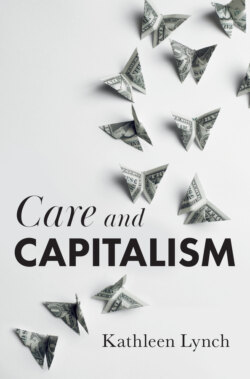Читать книгу Care and Capitalism - Kathleen Lynch - Страница 10
Acknowledgements
ОглавлениеFinancial support from the Irish Research Council (IRC) Advanced Research Project Grant (Advanced RPG) (RPG2013-2) to research Equality of Opportunity in Practice: Studies in Working, Learning and Caring provided me with the opportunity to write this book. I am deeply grateful to the IRC for what Bourdieu termed ‘the freedom from necessity to write’.
I also want to express my appreciation to the many universities that invited me to speak on affective equality and social justice in recent years, as these visits both enriched and challenged my thinking: the Autonomous University of Barcelona, City University of New York, Glasgow Caledonian University, the WISE Centre for Economic Justice, the Havens-Wright Center, University of Wisconsin Madison, Jagiellonian University, Krakow, Universities of Linköping and Örebro, Sweden, University of Melbourne, University of Macedonia in Thessaloniki, Greece, University of Oulu, Finland, University of Oxford, UK, Peking University, Beijing, and University of Siegen, Germany.
The deep concern and frustration that I have seen, felt and documented through research on classed/raced/ableist and other inequalities in education over several decades (in The Hidden Curriculum, 1989, Equality in Education, 1999, and with Anne Lodge in Equality and Power in Schools, 2002), and on the gendering of injustices under neoliberalism (with Bernie Grummell and Dympna Devine in New Managerialism in Education: Commercialization, Carelessness and Gender, 2012), demanded that I write about the injustices and carelessness of neoliberalism in greater depth, and in ways that not only examined its harms but identified ways of challenging them.
The book builds on earlier work with John Baker, Sara Cantillon and Judy Walsh in Equality: From Theory to Action (2004) and particularly in Affective Equality (2009). When Affective Equality: Love, Care and Injustice was published first in English in 2009, it generated an unexpected level of interest. It was translated into Spanish in 2014, and into Korean by Prof. Dr Soon-Won Kang of Hanshin University in 2017. It seemed to speak to people’s need to talk and read about things that mattered to them in their everyday lives, and how institutions and structures often impeded them in their love, care and solidarity work. I wanted to re-engage with the many issues that Affective Equality raised, in terms of understanding inequality and social injustice, and the politics of social change.
The encouragement and support I received from several colleagues in University College Dublin were also very important to me. I would like to thank the staff in the UCD School of Education, and especially Dympna Devine, for their ongoing support. I am really appreciative of the support of recent doctoral colleagues, Luciana Lolich, Majella Mulkeen, Meabh Savage and Dorothy Conaghan, who were pursuing studies in related fields, and of inspiring postdoctoral fellows with whom I worked when writing, John Bissett, Maria Ivancheva, Manolis Kalaitzake and Monica O’Connor. Thank you all for engaging conversations and comments at seminars, and chats over coffee and tea.
Sara Cantillon, Professor of Gender and Economics at the GCU Glasgow School for Business and Society and Director of the Centre for Economic Justice, was one of the first people who encouraged me to write a book on care and capitalism. I am deeply grateful for her support throughout. Mags Crean, UCD postdoctoral scholar, social justice activist, and sociologist in the School of Education, offered ongoing guidance, inspiration and critical feedback while I was writing the book; during the isolation of Covid-19 lockdown her support was invaluable. So indeed was that of other activist-scholars, especially John Bissett, Cathleen O’Neill and Ebun Joseph.
I could not have written the book without the belief and support of John, my beloved; as always, his hands-on love and care, his wit and sense of humour kept me going during hard times. The engagement, kindness and thoughtfulness of our children, Nóra and John, and their partners, Stephen and Rose, were of greater importance than they may have known. I also appreciated the quiet encouragement of my many friends, and of my sisters and brother throughout. I am especially grateful to my sister Ann for the time and attention she gave to proofing the text at the pre-submission stage.
Many thanks too to the staff at Polity Press, and especially to Jonathan Skerrett, Senior Commissioning Editor in Sociology, Health and Social Care, for believing in the concept of the book. His courtesy, encouragement and professionalism throughout were more than I could have hoped for. I also greatly appreciated the time and attention Karina Jákupsdóttir, Assistant Editor, gave to the work during different phases of writing and planning. The copy-editing undertaken by Fiona Sewell was invaluable. I am extremely grateful for her meticulous work, and the amount of time and consideration she devoted to the text.
Although written in my name, this book is owned by the many people who have contributed to it, the scholars from different disciplines from whom I learned so much, the many people who contributed to the empirical research that underpins it, the people whose names I do not know whom I met at so many different public lectures and conferences who challenged and encouraged me, and last but by no means least, the community groups and students, inside and outside the university, from whom I learned so much.
